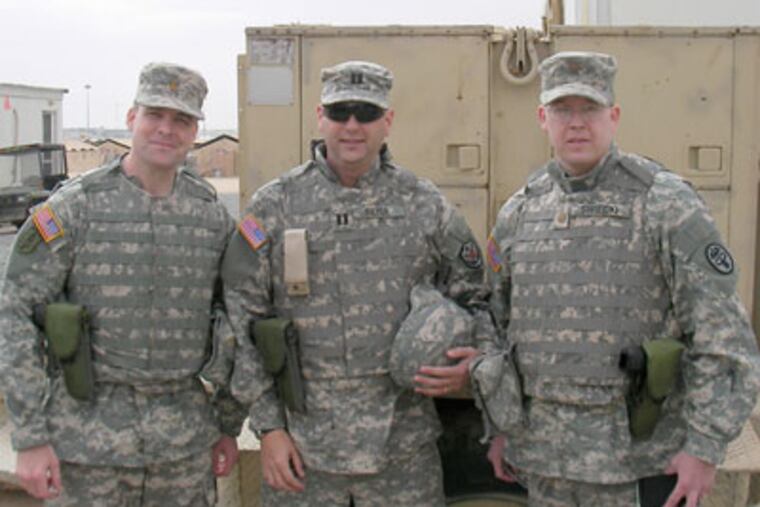John P. Pryor, 42, surgeon and soldier
John P. Pryor, 42, of Moorestown, the dedicated leader of the University of Pennsylvania's trauma team and a decorated major in the Army Reserve who wrote eloquently about the painful parallels between battlefield deaths and urban homicides, was killed on Christmas by enemy fire in Iraq while serving as a combat surgeon.

John P. Pryor, 42, of Moorestown, the dedicated leader of the University of Pennsylvania's trauma team and a decorated major in the Army Reserve who wrote eloquently about the painful parallels between battlefield deaths and urban homicides, was killed on Christmas by enemy fire in Iraq while serving as a combat surgeon.
Dr. Pryor deployed Dec. 6 and was with a risky frontline surgical unit when he was killed by shrapnel from a mortar round. It was his second tour of duty in Iraq.
Dr. Pryor, who was experienced and cool under pressure, was born in Mount Vernon, N.Y., and raised near Albany. He completed surgical training at the State University of New York in Buffalo, and came to the Hospital of the University of Pennsylvania in 1999. After a fellowship in trauma surgery and critical care, he joined Penn's surgical faculty and served as director of the hospital's nationally recognized trauma program.
"JP was a magical man, with boundless energy and goodness," said Dr. Pryor's mentor at Penn, Dr. C. William Schwab. "He was a devoted son, husband, father, colleague and friend. . . . At his core were many great values, but his passion for service to others" stood out.
In an undated document that Dr. Pryor wrote and left with family before he deployed, he recounted his early affinity for injured people, his passion to serve - specifically in wartime - and the difficulty of balancing his love of country and family, because he felt his decision to go to Iraq was not always supported by those closest to him.
"Since an early age, Dr. Pryor was involved in the care of the sick and injured," he wrote of himself in the third person. "He was certified in CPR when he was 14 years old, joined the Clifton Park-Halfmoon Ambulance Corps at 17, and became a N.Y. State Emergency Medical Technician at 18," adding that it was "emotionally very challenging" to balance his dedication to family and country. "He hopes and prays," he wrote, "for forgiveness from his family and colleagues."
Friends said a favorite quote from Albert Schweitzer that hung on Dr. Pryor's Penn office wall captured his spirit.
"Seek always to do some good, somewhere," it reads. "Even if it's a little thing, do something for those who need help, something for which you get no pay but the privilege of doing it. For remember, you don't live in a world all your own. Your brothers are here, too."
A technically skilled surgeon with a fierce adventurous streak, Dr. Pryor dashed to the heart of Ground Zero on Sept. 11, 2001, to volunteer his services. He wound up deciphering and filling medical requests that crackled over rescue-team radios.
"I don't think about it every day, but I've had flashbacks," he said in 2002.
As chief medical adviser to the Red Cross of Southeastern Pennsylvania, Dr. Pryor conducted disaster-relief training for volunteers. In those lectures, he drew parallels between the injuries soldiers experience on the battlefield and the injuries to shooting victims brought to Philadelphia emergency rooms.
"He was a brilliant guy, but he didn't intimidate people when he spoke to them about these issues," said Red Cross chief executive officer Tom Foley. "It's a cliche to say, 'Every man's death diminishes me,' but his death diminishes us more than a little, because he was doing things on so many fronts while also raising a family."
A talented writer, Dr. Pryor contributed opinion articles to The Inquirer and the Washington Post, and often was interviewed by NPR and ABC News.
"In Iraq, ironically, I found myself drawing on my experience as a civilian trauma surgeon each time 'mascals,' or 'mass casualty situations,' would overrun the combat hospital," he told NPR last year. "As nine or 10 patients from a firefight rolled in, I sometimes caught myself saying, 'Just like another Friday night in West Philadelphia.'"
A hard worker who drove himself relentlessly, Dr. Pryor took it personally when he was unable to save someone on his operating table.
In a 2006 Inquirer opinion piece describing his service with the 344th Combat Support Hospital in Abu Ghraib, Dr. Pryor wrote of the "palpable grief" that comes over the staff when a U.S. soldier doesn't survive.
"Everyone is affected and everyone deals with it in a different way. For me," he wrote, "it is very, very personal. I was the surgeon who couldn't save him. . . . The staff people come and give me a hug. They ask me if I am OK; they pray for me. I appreciate it, and I hate it at the same time."
Dr. Pryor is survived by his wife, Carmela V. Calvo, a pediatrician at St. Christopher's Hospital for Children; a daughter, Danielle; sons Francis and John Jr.; a brother; and his parents, Richard C. and Victoria.
Arrangements were incomplete, although the family expects that a Funeral Mass will be said at Our Lady of Good Counsel Roman Catholic Church in Moorestown.